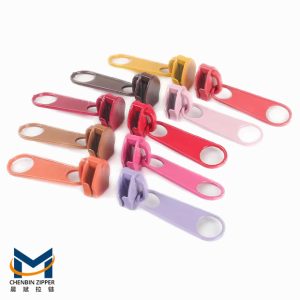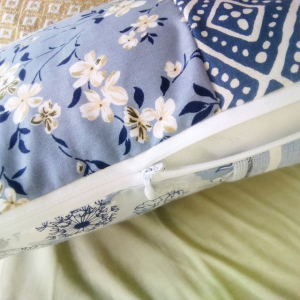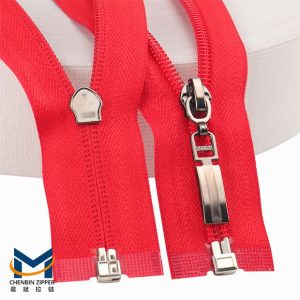Key Characteristics of High Quality Zippers

Material Composition and Durability
Metal vs. Nylon: Pros and Cons
| Feature | Metal Zippers | Nylon Zippers |
| Durability | Extremely durable and robust | Durable but more flexible |
| Weight | Heavier | Lightweight |
| Corrosion Resistance | Prone to rust if not treated | Resistant to rust and corrosion |
| Flexibility | Less flexible | Highly flexible |
| Cost | Generally more expensive | More cost-effective |
Influence of Fabric Type on Zipper Choice
Often, whether to use metal versus nylon zippers is driven by the type of fabric they will be matched with. If the fabric is heavy (denim or leather) then a metal zipper is used for added durability. On the other hand, nylon zippers offer the flexibility required with lightweight materials like polyester or cotton without the added weight.
Construction and Design Features
Teeth Alignment and Smooth Operation
The teeth of quality zips align perfectly, allowing the zip to play nicely. Teeth that are misaligned could either jam or separate under stress. The continuous filament coil in nylon zippers allows closure along its entire length, lending itself to smooth operating applications. Continuous filament coils found in nylon make for a seamless zipper up the length of the zipper and are perfect for smooth pull applications.
Slider Mechanism and Locking System
The slider mechanism is crucial for a zipper’s functionality. High–quality sliders glide effortlessly over the teeth without snagging. Locking systems prevent accidental opening, providing added security in applications like luggage or outerwear.
Techniques for Evaluating Zipper Quality
Visual Inspection Guidelines
Identifying Signs of Wear or Damage
Inspect zippers for visible signs of wear such as frayed edges, missing teeth, or damaged sliders. Such indicators suggest compromised integrity and reduced functionality.
Assessing Stitching and Attachment Quality
Examine the stitching holding the zipper in place. Quality stitching should be tight and uniform, ensuring that the zipper remains securely attached to the fabric even under stress.
Functional Testing Methods
Testing Smoothness and Ease of Use
To ensure the quality of a zipper, it is important to test its smoothness during operation. A good quality zipper should open and close smoothly without any resistance or noise. This indicates that the zipper is well-made and will provide a reliable and hassle-free experience for the user.
Evaluating Strength and Resistance
Test the zipper’s strength by applying moderate force when closed; it should resist separation without difficulty. This ensures reliability in demanding situations where durability is critical.
To summarize how to spot a good zipper, you have to pay attention to the material that it is made of, the features of the zipper itself in terms of construction, and conduct an extensive visual inspection in addition to the basic functional tests. Knowing these characteristics lets you choose zippers based on the parameters you need related to durability, functionality, and appearance.
Practical Applications in Various Industries
Fashion and Apparel Industry Considerations
The zipper is a key element in functionality and aesthetics in fashion & apparel. Zippers are of utmost importance in garments, which should not only look good but also perform better for a longer period of time. The fashion demand varies from luxury to casual, as does the type you get used by the zippers.
High-End Fashion vs. Everyday Wear Requirements
In high-end fashion, the zippers cannot just work; they have to work with the design. Luxury garments need zippers with special finishes or need a custom zipper that correlates with the image of the brand. For haute couture fabric, thin and not heavy, nylon zippers are the best fit as nylon zippers are lightweight and soft. On the other hand, a metal zipper is in use for its premium look and solid touch.
Practicality and affordability are crucial for everyday wear. The most common type of zipper used is nylon zippers which are cheap, durable, and smooth in operation. They strike a good balance between performance and price, which is great for mass-market pieces like jackets, pants, and casual dresses. They present a performance-price trade-off, which makes them appropriate for mass-produced garments such as jackets, pants and casual dresses.
Specialized Uses in Outdoor Gear and Equipment

While the dependability of outdoor gear and equipment is critical to performance, zippers are an essential component used in these products. Outdoor products such as tents, sleeping bags, backpacks, and outerwear need high-quality zippers to ensure they work properly on adventures. High-quality zipper in outdoor gear ensures that zippers on tents, sleeping bags, backpacks and outer garments perform well when it counts.
It is generally preferable to use nylon zippers where there is a scale of wetness and corrosion of metal and so on. They also have a low weight, so there is not so much useless added weight to your gear, something to be considered by those who prefer to carry gear a longer way in the wild. Lightweight also means they are less extra weight carried in gear, which matters to outdoorsy type for whom transportation is a big issue.
In addition, outdoor gear zippers often come with special features like waterproofing or reinforced teeth to provide additional protection from the elements. These improvements guarantee continued functionality of gear even in harsh conditions giving users peace of mind. What these features do is enhance the functionality of gear that you use when your work environment becomes extreme, bringing that peace of mind back to its users.
Being cognizant of the aspects required for a particular industry aids in the selection of the correct high-quality zippers for respective applications. From fashion making a choice that prioritizes aesthetics, to outdoor equipment making a choice that prioritizes durability, using the right kind of zipper sort will optimize product efficiency and consumers revel in plenty of fields. From fashion, where aesthetics may trump all else, to outdoor equipment, where durability is key — selecting the right zipper type improves the way products perform and how users enjoy them, in numerous industries.











